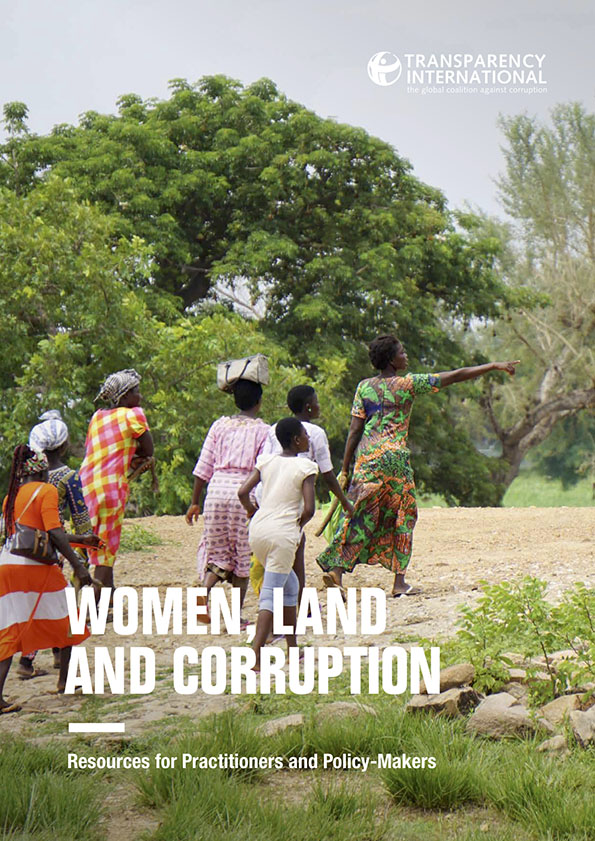Resource information
Women, Land and Corruption is a collection of unique articles and research findings that describe and analyse the prevalence of land corruption in Africa — and its disproportionate effect on women — presented together with innovative responses from organisations across the continent.
Corruption hits the poorest the hardest, undermining efforts to break the cycle of poverty and further distorting how income, resources and services are shared between women and men. Worldwide, one in five people report having paid a bribe for land services, however, in Sub-Saharan Africa every second client of land administration services is affected.
Women, Land and Corruption
Corruption exacerbates gender inequalities in society. Women experience and perceive corruption differently from men and are more vulnerable to specific types of corruption — particularly sexual extortion — due to their social, political and economic roles.
The links between land corruption and women’s wellbeing and prosperity are evident across Africa. Women’s strong dependency on land as a resource means that land corruption disadvantages them more than men. Such corruption takes many forms, including traditions preventing women from inheriting land, bribery and sexual extortion by community leaders and land officials, and multinational investors appropriating land traditionally worked by women. Land corruption increases gender disparities, which undermines women’s livelihoods and social standing and, ultimately, perpetuates poverty.
While awareness of land corruption as a phenomenon has increased over recent years, understanding and recognition of how women are affected differently from men has been lacking. There has been no single source of background information, lessons learnt and approaches to tackling land corruption — as it affects women — to inspire civil society and inform effective policy-making.
Latest research, varied perspectives and diverse responses
The Women, Land and Corruption resource book addresses the need for a consolidated source of information on gendered land corruption. By providing fresh insights from initiatives and organisations — woven together with the latest research from eight African countries — it presents evidence on how women are affected by land corruption together with tailored responses to addressing gender-based inequalities over land.
Women, Land and Corruption
Corruption exacerbates gender inequalities in society. Women experience and perceive corruption differently from men and are more vulnerable to specific types of corruption — particularly sexual extortion — due to their social, political and economic roles.
The links between land corruption and women’s wellbeing and prosperity are evident across Africa. Women’s strong dependency on land as a resource means that land corruption disadvantages them more than men. Such corruption takes many forms, including traditions preventing women from inheriting land, bribery and sexual extortion by community leaders and land officials, and multinational investors appropriating land traditionally worked by women. Land corruption increases gender disparities, which undermines women’s livelihoods and social standing and, ultimately, perpetuates poverty.
While awareness of land corruption as a phenomenon has increased over recent years, understanding and recognition of how women are affected differently from men has been lacking. There has been no single source of background information, lessons learnt and approaches to tackling land corruption — as it affects women — to inspire civil society and inform effective policy-making.
Latest research, varied perspectives and diverse responses
The Women, Land and Corruption resource book addresses the need for a consolidated source of information on gendered land corruption. By providing fresh insights from initiatives and organisations — woven together with the latest research from eight African countries — it presents evidence on how women are affected by land corruption together with tailored responses to addressing gender-based inequalities over land.
It includes the following three collections:
Country findings
Empirical evidence on land corruption together with information on legal and policy frameworks drawn from research conducted by Transparency International’s national chapters in eight African countries: Cameroon, Ghana, Kenya, Liberia, Madagascar, Sierra Leone, Uganda, Zimbabwe.
Key findings include:
- Women are often excluded from negotiations with investors during land deals.
- Women are less likely to receive adequate compensation for land acquired by external parties.
- In countries where legislation supports women’s land rights, enforcement is often weak and women’s claims are frequently undermined by traditional practice and custom.
- Women are particularly vulnerable to sexual extortion, including demands of sexual favours in return for land services.
Supporting arguments
Key international frameworks and critical perspectives, necessary to fully understand — and adequately address — land corruption as it affects women, are offered by a range of authors; helping to place the issue and necessary responses firmly within the global context. Included in this collection are articles that explore the importance of feminism, human rights, international frameworks (such as the Sustainable Development Goals), important African initiatives, and much more.
Developing responses
The final section includes a wide range of innovative responses to the intractable challenges of land corruption affecting women, as applied by various civil society organisations across Sub-Saharan Africa. This collection of 14 different practical approaches to overcoming land corruption includes descriptions of:
- a citizen journalism platform for Kenyan women to investigate and document a historical land dispute
- a participatory video project for Ghanaian women to analyse how land corruption prevents widows from realising their land rights
- open days in rural Uganda that provide unique opportunities for exchanges of information on land governance between women and local officials
Women, Land and Corruption was created as part of Transparency International’s Land and Corruption in Africa programme. It is available to download as a free PDF.
Follow @landcorruption on Twitter and Medium for more publications, news and information on how land corruption affects individuals and communities around the world.

